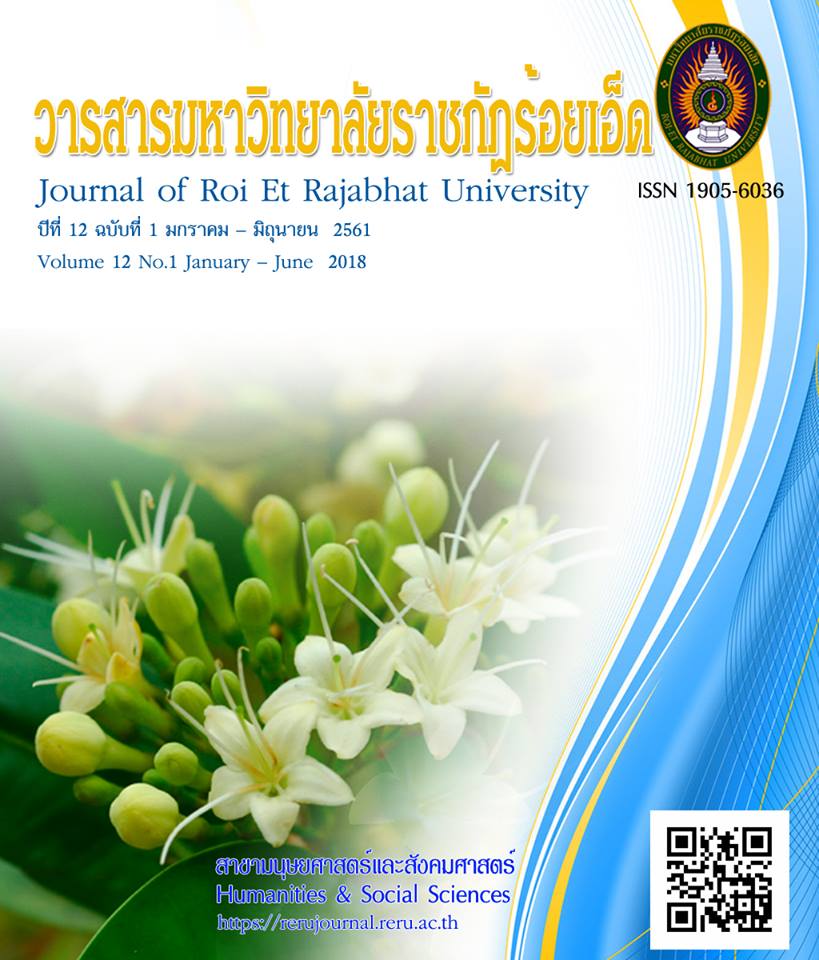Analytical Thinking Process of Students in a Fundamental Research Methodology in Social Science Subject
Keywords:
Analytical Thinking Process, Research Process, Fundamental Research Methodology in Social ScienceAbstract
The present research investigated students’ analytical thinking process in the subject “Fundamental Research Methodology in Social Science” based on Richard Paul’s theory of eight elements of thought. The participants of this study were 117 third year students who were enrolled in the subject “Fundamental Research Methodology in Social Science (SOC3301),” Social Studies major, Faculty of Education, Roi-Et Rajabhat University. The research methodology was a One-Shot Case Study. The research instruments included a constructed questionnaire and an interview concerning with students’ analytical thinking process. To analyze the data, statistics used in the study were means and standard deviation for quantitative data, and content analysis was employed for qualitative data. The results indicated that most of the students showed high overall mean scores of analytical thinking process in terms of problem viewing/entitling, purpose setting, and theoretical thinking respectively. The findings from the interview revealed that classroom group work enhanced students’ process of analytical thinking and understanding. They could interpret situations more clearly as the teacher supervised each group separately. The teacher’s supervision could better The teacher’s supervision could better stimulate their critical thinking and synthesizing skills than teaching in front of class. Moreover, the group work offered opportunities to the students to do group discussions in every class period which contributed to their thinking skills progressively and accordingly.
References
เกรียงศักดิ์ เจริญวงศ์ศักดิ์. (2549). การคิดเชิงวิเคราะห์. กรุงเทพ: ซัคเซสมีเดีย.
ชาติ แจ่มนุช. (2545). สอนอย่างไรให้คิดเป็น. กรุงเทพ: เลี่ยงเชียง.
ทิศนา แขมมณี. (2540). วิทยาการด้านการคิด. กรุงเทพ: มาสเตอร์กรุ๊ป แมนเนจเม้นท์ จำกัด.
รัชนี ทาเหล็ก. (2556). ผลการจัดการเรียนรู้แบบร่วมมือด้วยจิ้กซอร์ เรื่องเส้นขนานที่มีต่อความสามารถในการคิดวิเคราะห์ ของนักเรียนชั้นมัธยมศึกษาปีที่ 2. กรุงเทพ: บัณฑิตวิทยาลัย มหาวิทยาลัยศรีนครินทรวิโรฒ.
ลาวรรณ โฮมแพน. (2550). การศึกษาผลสัมฤทธิ์ทางการเรียนรู้วิทยาศาสตร์และความสามารถในการคิดของนักเรียน. กรุงเทพฯ บัณฑิตวิทยาลัย: มหาวิทยาลัยศรีนครินทรวิโรฒ.
วินิช สุธารัตน์. (2544). ความคิดและความคิดสร้างสรรค์. อยุธยา: คณะครุศาสตร์ สถาบันราชภัฏพระนครศรีอยุธยา.
วิลาวัลย์ เจริญวงศ์. (2547). ความสัมพันธ์ระหว่างการคิดวิเคราะห์ การคิดสร้างสรรค์ การคิด วิพากษ์กับความสามารถ. มหาสารคาม: บัณฑิตวิทยาลัย มหาวิทยาลัยราชภัฏมหาสารคาม. สิ
ทธิ์สมบูรณ์ สุธรรมวงศ์. (2557). การศึกษาทักษะการคิดวิเคราะห์ของนักศึกษาปริญญาตรี ชั้นปีที่ 3 โดยใช้รูปแบบการจัดการ. ขอนแก่น: บัณฑิตวิทยาลัย มหาวิทยาลัยขอนแก่น.
สุวิทย์ มูลคำ. (2547). กลยุทธ์การสอนคิดวิเคราะห์. กรุงเทพฯ: ห้างหุ้นส่วนจำกัดภาพพิมพ์.
องอาจ นัยพัฒน์. (2558). การวัดประเมินผู้เรียนในโลกยุคใหม่ของการเรียนรู้ศตวรรษที่ 21. การอบรมเรื่องการวัดประเมิน คุณธรรมจริยธรรม (ตามกรอบมาตรฐานคุณวุฒิแห่งชาติ-TQF). กรุงเทพ: มหาวิทยาลัยศรีนครินทรวิโรฒ ประสานมิตร.
อาร์ม โพธิ์พัฒน์. (2550). การศึกษาผลสัมฤทธิ์ทางวิทยาศาสตร์และความสามารถวิเคราะห์ของนักเรียนชั้น. กรุงเทพฯ: บัณฑิตวิทยาลัย มหาวิทยาลัยศรีนครินทรวิโรฒ.
Beyer, Barry K. (1985). eaching critical thinking skills: a direct approach. Social Education.
Downloads
Published
How to Cite
Issue
Section
License
บทความที่ได้รับการตีพิมพ์เป็นลิขสิทธิ์ของวารสารมหาวิทยาลัยราชภัฎร้อยเอ็ด
ข้อความที่ปรากฏในบทความแต่ละเรื่องในวารสารวิชาการเล่มนี้เป็นความคิดเห็นส่วนตัวของผู้เขียนแต่ละท่านไม่เกี่ยวข้องกับมหาวิทยาลัยราชภัฎร้อยเอ็ด และคณาจารย์ท่านอื่นๆในมหาวิทยาลัยฯ แต่อย่างใด ความรับผิดชอบองค์ประกอบทั้งหมดของบทความแต่ละเรื่องเป็นของผู้เขียนแต่ละท่าน หากมีความผิดพลาดใดๆ ผู้เขียนแต่ละท่านจะรับผิดชอบบทความของตนเองแต่ผู้เดียว





